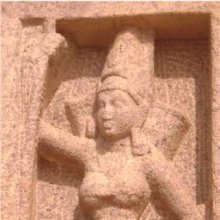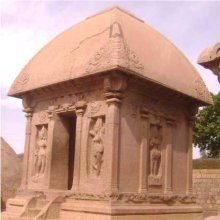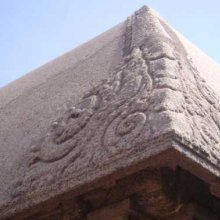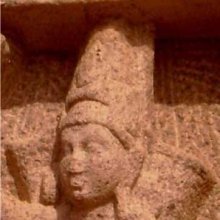Draupadi, Draupadī: 19 definitions
Introduction:
Draupadi means something in Hinduism, Sanskrit, Jainism, Prakrit, Hindi. If you want to know the exact meaning, history, etymology or English translation of this term then check out the descriptions on this page. Add your comment or reference to a book if you want to contribute to this summary article.
Images (photo gallery)
(+8 more images available)
In Hinduism
Purana and Itihasa (epic history)
Source: Wisdom Library: ItihasaDraupadi, the daughter of King Drupada who ruled over Panchal, was the wife of all the five Pandavas. Draupadi was given the status of a goddess in south India. After Yudhisthir was crowned as the king of both Hastinapura and Indraprastha, Draupadi became the queen.
Draupadi is regarded as Shakti (Goddess Kali) incarnate who was the sister of Vishnu. This makes Lord Krishna (an avtaar of Lord Vishnu) Draupadi`s brother.
Source: Wisdom Library: Bhagavata Purana1) Draupadī (द्रौपदी):—Daughter of Drupada (son of Pṛṣata). (see Bhāgavata Purāṇa 9.22.3)
2) Draupadī (द्रौपदी):—Wife to all five sons of Pāṇḍu (Yudhiṣṭhira, Bhīma and Arjuna through Kuntī by Dharmarāja and Nakula and Sahadeva through Mādrī by the two Aśvinī-kumāra brothers (Nāsatya and Dasra)). She bore one son to each of them. (see Bhāgavata Purāṇa 9.22.27-28)
The names of her sons are as follow:
- Prativindhya,
- Śrutakīrti,
- Śrutasoma,
- Śatānīka,
- Śrutasena
Draupadī is worshipped as a manifestation of the supreme goddess Parāśakti (6, 79, 81; 1991a: 46), as an incarnation of Śrī (Hiltebeitel 1988b, part 2), and as a multiform of Durgā (Hiltebeitel 1988a: 368-82; 1991a: 227, 242, 288, 327, 360, 458). But her rituals and myths center most often and most directly on her affinities with Kālī, whose “form” (Kālīrūpā) she takes on in her most violent and impure aspects (Hiltebeitel 1988a: 289-95, 434; 1991a: 397-416, 430, 437, 473).
Source: archive.org: Puranic EncyclopediaDraupadī (द्रौपदी).—Pāñcālī, the wife of the Pāṇḍavas. (See under Pāñcālī).
Source: Cologne Digital Sanskrit Dictionaries: The Purana IndexDraupadī (द्रौपदी).—The daughter of Yajñasena-Draupada, queen of the Pāṇḍavas and mother of five sons born to five brothers: Prativindhya to Yudhiṣṭhira, Śrutasena to Bhīma, Śrutakīrti to Arjuna, Śrutānīka to Nakula and Śrutakarma to Sahadeva;1 paid respects to Kṛṣṇa; being newly married was bashful;2 consoled by Kṛṣṇa and Satyabhāmā when banished to forest with her husbands;3 joy at Kṛṣṇa's visit to Indraprastha; welcomed Rukmiṇī and the other wives of Kṛṣṇa; served food, etc., in the Rājasūya; performed Avabhṛta with Yudhiṣṭhira after the Rājasūya; Duryodhana's mind on; laughed at Duryodhana's fall in the Sabhā of Maya;4 asked Kṛṣṇa's wives about their marriage when all met at Syamantapañcaka and was lost in wonder.5 Her sons were killed while asleep by Aśvatthāma; when the murderer was brought before her, she ordered his release as he was a Brahmana and the son of the preceptor; followed the funeral party to the Ganges for the cremation of her dead sons;6 was one among the party that welcomed Vidura;7 out of devotion to Vāsudeva attained His lotus feet.8 Felt sorry for the loss of Duryodhana and others.9
- 1) Bhāgavata-purāṇa IX. 22. 2, 28; Matsya-purāṇa 50. 51; Vāyu-purāṇa 99. 246; Viṣṇu-purāṇa IV. 20. 41-2;
- 2) Bhāgavata-purāṇa X. 58. 5.
- 3) Ib. X. 64. 10.
- 4) Ib. X. 71. 41-3; 75 (whole).
- 5) Ib. X. 83. 6-7; 84. 1;
- 6) Ib. I. 7. 14 to the end; 8. 1 and 3, 17; 10. 9;
- 7) Ib. I. 13. 4.
- 8) Ib. I. 15. 50.
- 9) Matsya-purāṇa 103. 12; 112. 1; 244. 4.

The Purana (पुराण, purāṇas) refers to Sanskrit literature preserving ancient India’s vast cultural history, including historical legends, religious ceremonies, various arts and sciences. The eighteen mahapuranas total over 400,000 shlokas (metrical couplets) and date to at least several centuries BCE.
Vaishnavism (Vaishava dharma)
Source: Pure Bhakti: Brhad BhagavatamrtamDraupadī (द्रौपदी) refers to:—The daughter of King Drupada and wife of the Pāṇḍavas. (cf. Glossary page from Śrī Bṛhad-bhāgavatāmṛta).

Vaishnava (वैष्णव, vaiṣṇava) or vaishnavism (vaiṣṇavism) represents a tradition of Hinduism worshipping Vishnu as the supreme Lord. Similar to the Shaktism and Shaivism traditions, Vaishnavism also developed as an individual movement, famous for its exposition of the dashavatara (‘ten avatars of Vishnu’).
Kavyashastra (science of poetry)
Source: Shodhganga: Bhismacaritam a critical studyDraupadī (द्रौपदी) figures as a female character in the Bhīṣmacarita (Bhishma Charitra) which is a mahākāvya (‘epic poem’) written by Hari Narayan Dikshit.—Draupadī was the daughter of Drupada, the King of Pāñcāla, but she was not born of a womb. She emanated as it were, from a sacrificial altar. She possessed unparalleled charm and grace. When Draupadī was of marriageable age, King Drupada held a Svayaṃvara. The Kauravas, Karṇa, Śiśupāla, Jarāsandha, Śrī Kṛṣṇa and even Pāṇḍavas in the disguise form were present at the Svayaṃvara. One by one, many kings and princes came forward to hit the eye of the fish. But none succeeded. Embarrassed and disappointed, they returned to their seats. At last Arjuna stood from his seat, picked up the bow, strung it, looked in the water, aimed at the target, shot an arrow and won the challenge and Draupadī both. Then she became the wife of all five Pāṇḍavas. Our poet has depicted her character as beautiful and devoted wife in his epic ‘Bhīṣmacarita’.
Draupadī was very intelligent and endowed with learning. Extraordinary was her sense of selfless sacrifice. Her supreme dedication to her husbands was acknowledged by one and all. She was ardently devoted to the Lord and supremely faithful to her husbands. She had unflinching love for the revered feet of Lord Kṛṣṇa. She considered Him not only as a saviour, well-wisher and claimed Him to be her supreme kinsmen but also had profound faith in His omnipotence and omnipresence. The root cause of the extermination of the Kauravas in the battle of Mahābhārata was undoubtedly the humiliation of Draupadī who was faithfully devoted to her husbands.

Kavyashastra (काव्यशास्त्र, kāvyaśāstra) refers to the ancient Indian tradition of poetry (kavya). Canonical literature (shastra) of the includes encyclopedic manuals dealing with prosody, rhetoric and various other guidelines serving to teach the poet how to compose literature.
General definition (in Hinduism)
Source: WikiPedia: HinduismDraupadī (द्रौपदी): Daughter of King Drupada, King of Panchala, who married all the five Pandavas though Arjuna had won her in the Swayamvara, because of the vow that they would share everything in common.
In Jainism
General definition (in Jainism)
Source: JAINpedia: Women in the Jain tradition: Soḷ satīDraupadī (द्रौपदी) refers to one of the 16 Satīs mentioned in the Brāhmī Candanbālikā.—In Jain contexts “Satī” revolves around fidelity to the Jain religion. Although Jains call many virtuous Jain women satīs, among Śvetāmbara Jains there is a group of satīs called the soḷ satī or 16 Satīs (i.e., Draupadī). These Jain Satīs are revered as role models for women and their stories are widely known. Even though the general group of Satī grows over time, the group of 16 Satīs is unchanging.
Source: academia.edu: Tessitori Collection I1) Draupadī (द्रौपदी) refers to one of the “sixteen virtuous Jain women”, according to the “Sola satyā” (dealing with the lives of Jain female heroes), which is included in the collection of manuscripts at the ‘Vincenzo Joppi’ library, collected by Luigi Pio Tessitori during his visit to Rajasthan between 1914 and 1919.—There is a list of sixteen virtuous Jain women. [...] These women [e.g., Draupadī] are virtuous because they uphold Jain values and could stand to them even in adverse circumstances. Reciting their names is often part of the morning ritual. Behind names are eventful stories that have been told by several writers and read or listened to by Jain followers.
2) Draupadī (द्रौपदी) or Draupadīcopaī is the name of a work by Kanakakīrti dealing with the lives of Jain female heroes.—The story (of the Draupadī-copaī ) is explicitly taken from the sixth aṅga of the Śvetāmbara canon, the Jñātādharmakathānga, chapter 16 (see vs. 6 above). The beginning of the story itself is hardly legible because of the bad condition of the first page. It starts with a king Jitaśatru, his queen Dhāriṇī and the clever minister Abhayakumāra.

Jainism is an Indian religion of Dharma whose doctrine revolves around harmlessness (ahimsa) towards every living being. The two major branches (Digambara and Svetambara) of Jainism stimulate self-control (or, shramana, ‘self-reliance’) and spiritual development through a path of peace for the soul to progess to the ultimate goal.
Languages of India and abroad
Sanskrit dictionary
Source: DDSA: The practical Sanskrit-English dictionaryDraupadī (द्रौपदी).—[drupadasyāpatyaṃ strī-aṇ ṅīp] Name of the daughter of Drupada, king of the Pāñchālas. [She was won by Arjuna at her Svayaṃvara ceremony, and when he and his brothers returned home they told their mother that they had that day made a great acquisition. Whereupon the mother said, "Well, then, my dear children, divide it amongst yourselves." As her words once uttered could not be changed, she became the common wife of the five brothers. When Yudhiṣṭhira lost his kingdom and even himself and Draupadī in gambling, she was grossly insulted by Duhśāsana (q. v.) and by Duryodhana's wife. But these and the like insults she bore with uncommon patience and endurance, and on several occasions, when she and her husbands were put to the test, she saved their credit (as on the occasion of Durvāsas begging food at night for his 6, pupils). At last, however, her patience was exhausted, and she taunted her husbands for the very tame way in which they put up with the insults and injuries inflicted upon them by their enemies (see. Kirātārjunīya 1.29-46). It was then that the Pāṇḍavas resolved to enter upon the great Bhāratī war. She is one of the five very chaste women whose names one is recommended to repeat; see अहल्या (ahalyā).)
Source: Cologne Digital Sanskrit Dictionaries: Edgerton Buddhist Hybrid Sanskrit DictionaryDraupadī (द्रौपदी).—(?) , name of a devakumārikā (or of two? see below) in the Western Quarter: Mahāvastu iii.308.9; Lalitavistara 390.6. Mss. of both confused, and readings doubtful; Senart reads kṛṣṇā śukrā ca dr°, the dark and light Dr.; Lalitavistara may go back to some such reading; some of its mss. and Lefm.'s. text contain kṛṣṇā. It hardly needs to be recalled that Kṛṣṇā was the name of the epic heroine known as Draupadī.
Source: Cologne Digital Sanskrit Dictionaries: Shabda-Sagara Sanskrit-English DictionaryDraupadī (द्रौपदी).—f. (-dī) A proper name. Draupadi, the daughter of Drupada, king of Panchala, and the common wife of the five Pandava princes. E. drapada the father of this lady, and aṇ and ṅīp affixes.
Source: Cologne Digital Sanskrit Dictionaries: Cappeller Sanskrit-English DictionaryDraupadī (द्रौपदी).—[feminine] patron. of Kṛṣṇā, the daughter of Drupada and wife of the five Pāṇḍu princes.
Source: Cologne Digital Sanskrit Dictionaries: Monier-Williams Sanskrit-English Dictionary1) Draupadī (द्रौपदी):—[from draupada] a f. See below.
2) [from draupada] b f. [patronymic] of Kṛṣṇā (wife of the Pāṇḍu princes), [Mahābhārata; Harivaṃśa etc.] (identified with Umā, [Skanda-purāṇa])
Source: Cologne Digital Sanskrit Dictionaries: Yates Sanskrit-English DictionaryDraupadī (द्रौपदी):—(dī) 3. f. A proper name, wife of the five Pāndu princes.
Source: DDSA: Paia-sadda-mahannavo; a comprehensive Prakrit Hindi dictionary (S)Draupadī (द्रौपदी) in the Sanskrit language is related to the Prakrit word: Dovaī.
Sanskrit, also spelled संस्कृतम् (saṃskṛtam), is an ancient language of India commonly seen as the grandmother of the Indo-European language family (even English!). Closely allied with Prakrit and Pali, Sanskrit is more exhaustive in both grammar and terms and has the most extensive collection of literature in the world, greatly surpassing its sister-languages Greek and Latin.
Hindi dictionary
Source: DDSA: A practical Hindi-English dictionaryDraupadī (द्रौपदी):—(nf) wife of the Pandavas in the great epic Mahabharat; —[kā cīra] (a process etc.) that knows no end; —[kī baṭaloī] a blessed utensil that feeds one and all.
...
Kannada-English dictionary
Source: Alar: Kannada-English corpusDraupadi (ದ್ರೌಪದಿ):—
1) [noun] the main female character in Mahābhārata, the great Indian epic.
2) [noun] a Northern constellation between Cassiopeia and Pisces containing the nearest spiral galaxy, Andromeda galaxy M31, which is visible to the naked eye; Andromeda.
Kannada is a Dravidian language (as opposed to the Indo-European language family) mainly spoken in the southwestern region of India.
See also (Relevant definitions)
Starts with: Draupadi-maale, Draupadi-mala, Draupadi-male, Draupadicopai, Draupadiharana, Draupadiharanaparva, Draupadija, Draupadiparinaya, Draupadiparinayacampu, Draupadipramatha, Draupadisatyabhamasamvadaparva, Draupadisvayamvara, Draupadivastraharana.
Full-text (+176): Yajnaseni, Draupadeya, Nityayauvana, Vedija, Pandusharmila, Pancali, Sairandhri, Punyashloka, Parshata, Pancavallabha, Sudeshna, Pancalaputrika, Kicaka, Prativindhya, Shrutakirti, Shrutakarma, Satyasandha, Yuyutsu, Yajnasena, Venisamhara.
Relevant text
Search found 76 books and stories containing Draupadi, Draupadī, Draupati; (plurals include: Draupadis, Draupadīs, Draupatis). You can also click to the full overview containing English textual excerpts. Below are direct links for the most relevant articles:
Tiruvaymoli (Thiruvaimozhi): English translation (by S. Satyamurthi Ayyangar)
Introduction to Section 1.6 < [Section 6 - Sixth Tiruvaymoli (Parivatu il icanai)]
Pasuram 1.6.1 < [Section 6 - Sixth Tiruvaymoli (Parivatu il icanai)]
Pasuram 6.10.1 < [Section 10 - Tenth Tiruvaymoli (Ulakam unta Peruvaya)]
Dasarupaka (critical study) (by Anuru Ranjan Mishra)
Part 12 - Society in the Dūtavākya < [Chapter 5 - Vyāyoga (critical study)]
Part 2 - Summary of the drama (Dūtavākya) < [Chapter 5 - Vyāyoga (critical study)]
Part 13 - Status of Women in the Dūtavākya < [Chapter 5 - Vyāyoga (critical study)]
Dramaturgy in the Venisamhara (by Debi Prasad Namasudra)
Veṇīsaṃhāra: Sixth Act (summary) < [Chapter 3 - A general outline of Veṇīsaṃhāra]
Veṇīsaṃhāra: First Act (summary) < [Chapter 3 - A general outline of Veṇīsaṃhāra]
Purpose of the study < [Chapter 1 - Introduction]
Early Chola Temples (by S. R. Balasubrahmanyam)
Pallava < [Chapter XIII - Prasada: Component Parts]
Sikhara < [Chapter XIII - Prasada: Component Parts]
Temples in Kodumbalur < [Chapter IV - Temples of Sundara Chola’s Time]
The Bhagavata Purana (by G. V. Tagare)
Chapter 83 - Narration of Their Marriage Episodes by Kṛṣṇa’s Consorts < [Book 10 - Tenth Skandha]
Chapter 7 - Punishment of Āśvatthāman < [Book 1 - First Skandha]
Chapter 75 - Discomfiture of Duryodhana < [Book 10 - Tenth Skandha]
The Devi Bhagavata Purana (by Swami Vijñanananda)
Chapter 7 - On shewing the departed ones < [Book 2]
Chapter 16 - On the glory of the Devī < [Book 3]
Chapter 12 - On the Ambā Yajña rules < [Book 3]
Related products






